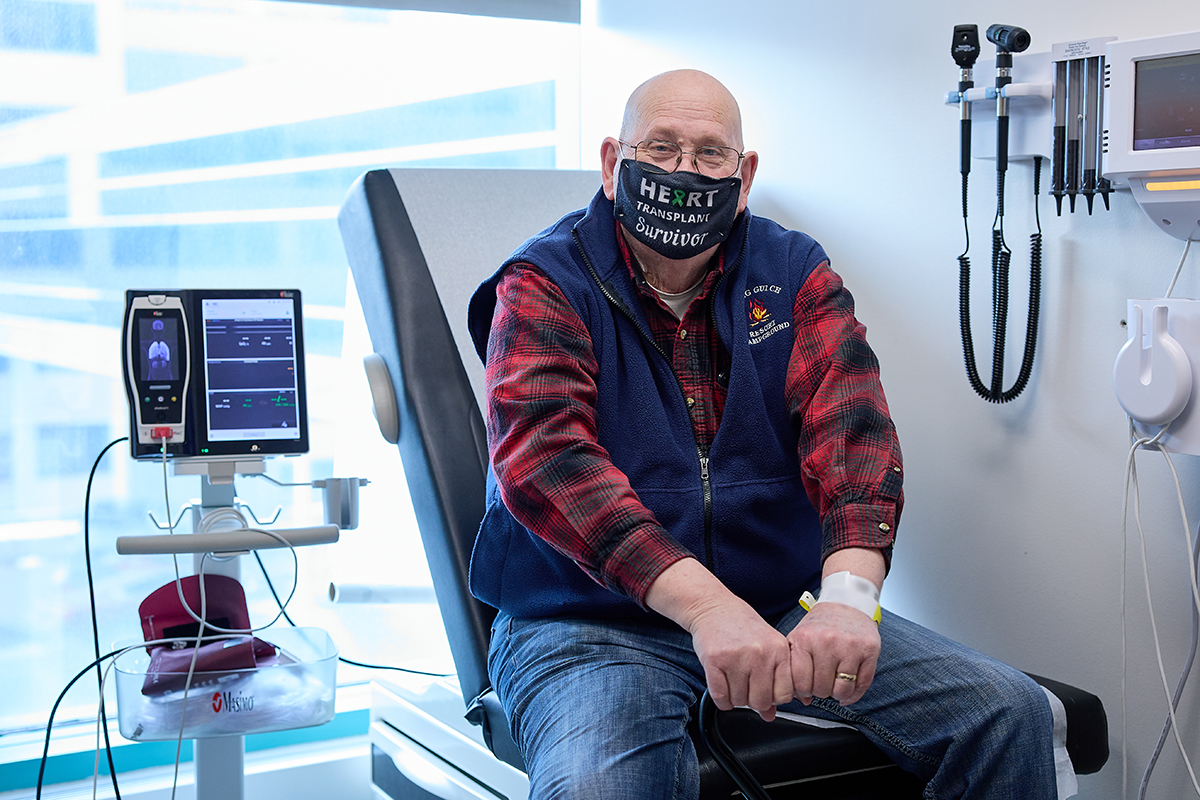
Life after heart transplantation can look very different, especially in the months following your surgery. Symptoms from heart diseases such as end-stage heart failure should improve dramatically. And many can perform the same level of physical activity and have the same quality of life as those who have not had a heart transplant. At Temple, we have achieved outstanding heart transplant survival rates.
We tailor your care after surgery to meet your unique needs and to help ensure you’re as healthy as possible and thriving.
Post-Surgery Care at the Hospital
The first few hours to weeks after your heart transplant are a critical time for you, as your body adapts to its new healthy heart. You will need close monitoring after surgery as you recover.
Just after your surgery, you will be admitted to the ICU for an average of 5 days and then transferred to a recovery room for a 7- to 10-day stay.
During this time, you can expect to:
- Be on a ventilator until you can breathe and cough on your own
- Perform coughing and breathing exercises under the guidance of a nurse every 2 hours
- Be on a heart monitor throughout your admission
- Receive educational support from members of the transplant team
Post-Surgery Care at Home
Once you leave the hospital, you and your caregivers will take a more active role in the care of your new donor heart. This includes frequent check-ins and appointments with Temple’s heart transplant team to help ensure your recovery is going well and reduce your chance of organ rejection.
During this time, you will:
- Conduct calls with your heart transplant coordinator to manage your medication, discuss your transition back home, and review information about activities that you should and should not do until instructed — such as driving, working and sexual activity
- Attend virtual and in-office appointments with your physicians
- Have tests and procedures, including heart biopsies to check for signs of rejection
- Perform cardiac rehabilitation activities, such as caring for your incision, moving around and breathing exercises. Here are 5 ways cardiac rehab can improve your heart health.
After your heart transplant, watch for side effects and signs of complications or organ rejection, including:
- Redness, swelling, bleeding, drainage or pain at the incision site
- Trouble breathing
- Excessive fatigue
- Low blood pressure
Contact your doctor immediately if you experience any of these symptoms. Staying in close contact with your medical team and attending all appointments and procedures can help reduce your risk of side effects and complications.
Medicine to Prevent Heart Rejection and Infection
You must take anti-rejection medicine every day for the rest of your life to prevent the rejection of your new heart. Blood work must also be performed to monitor the side effects of anti-rejection medicine.
You should refill your medications on time to avoid missing a dose. You should not be taking any over-the-counter medications or herbal supplements unless cleared by the transplant team.
Additional post-heart transplant medications
Temple’s transplant team may prescribe additional medications to help manage other medical problems, such as:
- Pain
- Infection
- High blood pressure
- Diabetes
- High cholesterol or lipid levels
Preventing risk of infection
Anti-rejection medicine may negatively affect the immune system and possibly lead to infections such as:
- Thrush
- Herpes
- Respiratory viruses
You can help prevent the risk of infection during the first few months after surgery. You should:
- Avoid crowds, especially during high-risk periods such as flu season
- Avoid contact with animals, especially their feces
- Practice good hygiene — wash your hands often
- Practice good dental hygiene
- Avoid loved ones when they’re sick
Keep in contact with your transplant team at Temple if you experience any symptoms or believe that you may have an infection.
Living a Heart-Healthy Lifestyle
A new heart is a gift that must be cared for. You may need to make lifestyle changes to best care for your donor heart. Routine exercise, proper diet and avoiding smoking, alcohol and triggering chemicals are all essential to help you enjoy the benefits of your new heart for a long time.
In particular, you should:
- Achieve and maintain a healthy weight
- Limit sugar and concentrated sweets
- Modify fat content by limiting how much fat you consume and replacing unhealthy fats with polyunsaturated fats
- Restrict sodium intake
Temple nutritionists can work with you to develop a dietary plan that helps you take care of your donor heart and stay as healthy as possible.
Just as important is maintaining good emotional health. Patients who have received a heart transplant may experience a range of emotions after surgery — including fear, depression and anxiety. Our transplant team can help connect those experiencing these emotions with a professional counselor or support group.
Why Choose Temple Health for Heart Transplants
Our Heart Transplant team has a high degree of experience helping patients through the transplant recovery process. We stay with our patients for the long-term to make sure they get all the support they need.
Outstanding Heart Transplant Outcomes
Based on the January 2024 Scientific Registry of Transplant Recipients report: